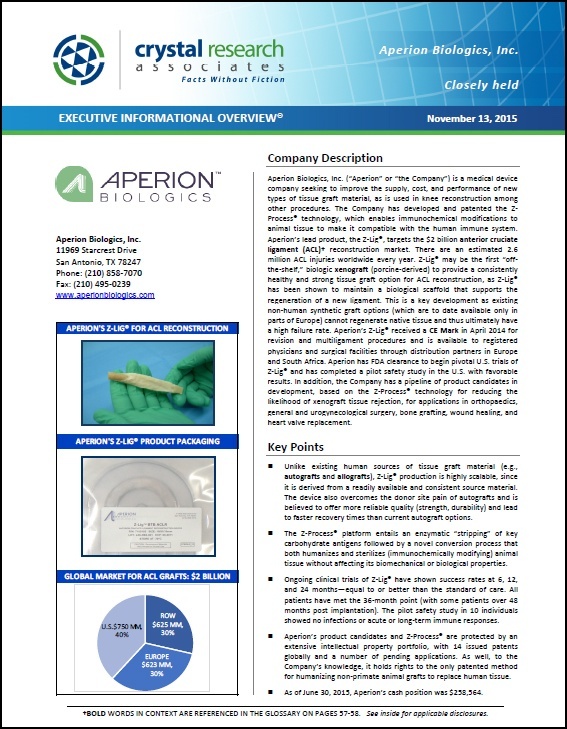Investment Highlights for Aperion Biologics, Inc.
You Might Also Like...

10 Reasons to Look at Aperion Biologics
-
There is an unmet need for new technology alternatives for ACL reconstruction procedures as nearly all surgeons performing this procedure utilize only two graft types—autograft (taken from the patient) and allograft (taken from a cadaver)—with each graft type having their respective shortcomings. Autografts have been associated with an increase in operation time, complications, morbidity, and rehabilitation time, and a decrease in function at the harvest site. Allografts may suffer from supply constraints, unpredictable and variable tissue quality (along with the possibility for disease transmission), as well as a lack of availability in many global markets. Furthermore, allografts are generally not accessible in a majority of European and other international markets for a variety of reasons—either legal, religious, cultural, or otherwise—thus making an alternative technology for ACL reconstruction all the more necessary. The only non-human products available for ACL reconstruction are synthetic grafts, which are only available and approved in parts of Europe or other international markets (with limitations) and are not able to regenerate (thus, they eventually fail due to durability issues).
-
Aperion has developed what it believes to be the first “off-the-shelf” biologic xenograft (porcine-derived) ACL reconstruction product that has proven to be consistently healthy and strong, while minimizing the potential for rejection. When initially implanted, Z-Lig® contains no live cells, and over time, is gradually populated and remodeled using a patient’s own cells to yield a mature human ligament through the process of “ligamentization.” The Z-Lig® is believed to remodel at a similar rate as human allografts, with substantial ligamentization occurring over 6 to 12 months and complete remodeling over two to three years—with remodeling believed to be key to long-term functionality of the Z-Lig®.
-
The Company believes that the Z-Lig® is novel in the ACL industry due to its ability to successfully maintain a biological scaffold, where the scaffold functions and supports the regeneration of a new ligament. Accordingly, the Z-Lig® could transform the standard of care for ACL reconstructions and disrupt the allograft industry, where there is a perceived lack of competition from any FDA-approved product.
-
While the pilot safety study was initially conducted to assess the safety and implantability of Z-Lig®, its original participants have now had a Z-Lig® implanted for over 12 years and continue to demonstrate safety and efficacy. The safety pilot study in 10 individuals showed no infections or acute or long-term immune responses. In addition, ongoing European clinical trials have demonstrated success rates at 6, 12, and 24 months, which are equal to or better than the standard of care. All patients have met the 36-month time point (with some patients over 48 months post implantation).
-
Market expenditures for ACL autografts and allografts are estimated at over $2 billion worldwide—including $750 million in the U.S. (300,000 ACL procedures annually), $623 million in Europe (265,000 ACL procedures annually), and $625 million in the rest of the world (250,000 procedures annually). These expenditures include both the cost of allografts and the direct surgical costs of the autograft harvesting and subsequent direct incremental rehabilitation and medication costs related to the second surgical site. Within the medical device arena, the xenograft market—in which the Z-Lig® participates—has shown to be well accepted. Derived from porcine, bovine, and equine sources, xenografts have been used as heart valves, extracellular matrices (patches), injectable collagen, and other replacement/augmentation tissues.
-
Aperion’s Z-Lig® is priced between $1,500 to $2,500 (versus $1,800 to $3,500 for allografts and autografts), with its production being highly scalable, given that it is derived from a readily available and consistent source material. The Company believes that production of Z-Lig® may provide support for higher gross margins than current allograft products.
-
The Z-Process® has broad applicability to many other tissue needs beyond ACL replacement. The main complication that has historically prevented animal-derived tissue from being used in human transplantation is the potential for rejection. If this immune response is mitigated, as Aperion’s Z-Process® seeks to do, animal tissue can be incorporated without having to suppress a patient’s immune system. Using its technology platform, Aperion is also developing product candidates for use in orthopaedics, general and urogynecological surgery, bone grafting, wound healing, and heart valve replacement.
-
Aperion’s product candidates and processes are covered by 14 issued U.S. and international patents and five pending patents. The issued patents cover the treatment of most tissues, such as tendons, ligaments, cartilage, vessels, valves, bone, and others, derived from any species of non-primate animal, such as pig, sheep, cow, and horse (including any genetically modified versions), noting that to the Company’s knowledge, it holds the rights to the only patented method for humanizing non-primate animal grafts to replace tissue in humans.
-
With a broad patent portfolio and a lack of any biologic candidates that the Company believes could be considered viable competitors in clinical development, Aperion aims to be the only entity marketing a tissue-based alternative to human-sourced ACL grafts for many years to come. While most major orthopaedic medical device companies have established divisions dedicated to orthopaedic biologics (orthobiologics) and/or have demonstrated an intent to expand into such markets, Aperion’s patent portfolio may serve to prevent such companies from attempting to independently develop animal-based products within its respective category.
-
The Company was founded by Dr. Kevin Stone, who is the founding scientist of Aperion and served as its chief executive officer from 1996 to 2008, as a director since its inception, and as chairman of the board since 2014. Dr. Stone is an established orthopaedic surgeon who founded the Stone Clinic (http://www.stoneclinic.com/dr-stone) in 1988, which is an orthopaedic clinic focused on biologic approaches to treating joint injuries. He is also the founder and chairman of Stone Research Foundation, an independent research institution investigating new techniques for joint health, arthritis, and human performance.
